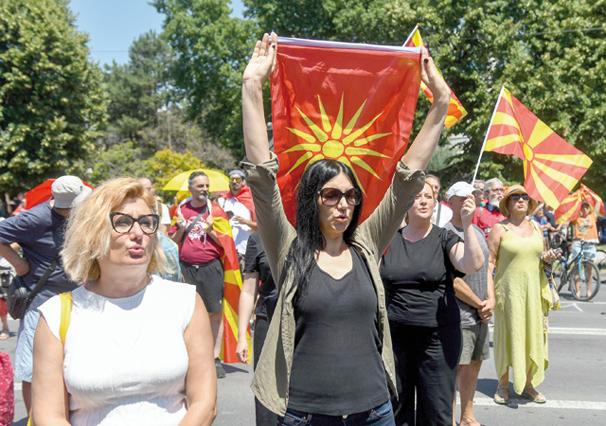You are here
EU opens membership talks with Albania and North Macedonia
By AFP - Jul 19,2022 - Last updated at Jul 19,2022

Opposition supporters protest against the proposal to end the conflict with Bulgaria and open EU accession negotiations, as they gather outside of the Parliament in Skopje, on Saturday (AFP photo)
BRUSSELS — Albania and North Macedonia took a step forward on their long road towards European Union membership on Tuesday, joining Balkan neighbours Serbia and Montenegro in formal negotiations with Brussels.
Accession to the bloc will still take years, but EU officials hope the long-delayed breakthrough will reassure sceptical Albanians and Macedonians that they are on the right path.
The next formal step will be the organisation of a conference between EU leaders and the candidates’ governments to agree a negotiating framework.
Serbia held its first “intergovernmental accession conference” in 2014 and Montenegro started negotiations in 2012 — neither is yet seen as on the threshold of membership.
European Commission president Ursula von der Leyen nevertheless warmly congratulated prime ministers Edi Rama of Albania and Dimitar Kovacevski of Macedonia.
“This is what your citizens have been waiting for so long and have been working for so hard, and this is what they deserve,” she said.
Albania has at times had cause to regret that progress in its application has been tied to that of its neighbour — which has faced tougher diplomatic resistance.
“It is a great satisfaction that, after 17 years today, we are finally starting the negotiations,” said Kovacevksi, whose country faced many hurdles, including a forced name change, on the path towards the EU.
“We are opening new perspectives for our country and for the citizens and steadily but surely we are joining the large European family.”
Rama, whose country applied for membership in 2009, admitted that the talks might take a while.
‘Countless reforms’
“We know it’s not the beginning of the end, it’s just the end of the beginning,” he said, paraphrasing British premier Winston Churchill’s comment in 1942 — three years before the end of World War II.
Once the terms of their membership are agreed, the two countries will still have to secure the support of all 27 current member states — some of which may hold national referendums before giving the green light.
Von der Leyen hailed Tuesday’s step forward, arguing that both Tirana and Skopje had already made great progress in reforms to adopt European norms and standards.
“You’ve demonstrated resilience. You maintained faith in the accession process. You strengthened the rule of law. You fought against corruption. You have free media,” she said.
“You have a vibrant civil society. You’ve done countless reforms, and you’ve modernised your economy.”
Macedonia declared independence from Yugoslavia in 1991 and changed its name to North Macedonia in 2018 to overcome a bitter dispute with Greece that had blocked its NATO membership bid.
The route to the European Union was still blocked, however, first by reticence in western capitals, particularly Paris, about allowing in their relatively poor and politically unruly Balkan neighbours.
Then Skopje’s neighbour Bulgaria ambushed the bid, vetoing any progress over a raft of complaints about recognition of North Macedonia’s history, culture and language.
Notably, the compromise will allow Macedonian — which some in Sofia regard as a Bulgarian dialect — to be adopted as an official language of the EU in its own right.
On Saturday, Kovacevksi’s government announced it had struck a compromise with Sofia involving further constitutional changes, but he could yet face more opposition at home.
In Brussels, however, it was all smiles as the leaders formally marked the start of negotiations.
Germany has been a champion of North Macedonia’s cause, and minister for Europe Anna Luehrmann hailed “a truly historic day” and promised progress once the constitutional changes are passed.
Shared interests
“North Macedonia can rely on the EU,” she said.
“Today we clearly decide that the second inter-governmental conference will take place as soon as the constitutional amendments are passed.
“This is set in stone, this cannot be changed by Bulgaria or anyone else.”
The two new candidate countries will also be invited to join a proposed European Political Community, an idea championed by France’s President Emmanuel Macron.
This new grouping will seek to deepen cooperation between EU members, EU candidates and European countries outside the union on shared interests such as security and energy supplies.
Details have yet to be fleshed out, and the group is not intended as an alternative to the membership process, but the first meeting could be held on October 6 and 7 in Prague.
Related Articles
SKOPJE, Republic of North Macedonia — Several thousand people protested on Saturday in North Macedonia’s capital Skopje against a proposal a
PRAGUE — North Macedonia’s foreign minister called on the EU on Tuesday to end the “blackmail” of his country through the imposition of fres
LUXEMBOURG — EU leaders at a summit this week will consider bids by Albania and North Macedonia to start accession talks despite opposition












